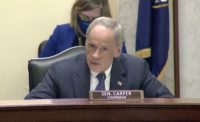

The two-year-long quest for a multi-year surface transportation bill still goes on, but it has taken a step forward with the Senate Environment and Public Works Committee’s approval on Nov. 9 of a two-year, $85.3-billion highway authorization.
At that level, highway programs would be funded at current levels plus inflation.
But lawmakers still need to find an additional $12 billion to fully fund the legislation, because projected Highway Trust Fund revenue falls short of the goal.
In addition, House Republicans have announced plans to join a surface-transportation bill with provisions to expand oil and gas drilling, including a small portion of the Arctic National Wildlife Refuge--provisions that are likely to draw opposition from environmental groups and their Democratic allies in Congress.
Construction industry and state transportation officials praised the “EPW” committee’s 18-0 vote for the bill, dubbed “MAP-21,” for Moving Ahead for Progress in the 21st Century. But they also noted the financing challenge.
Committee Chairman Barbara Boxer (D-Calif.) said the bill represents “a very strong commitment to our transportation system and to the health of our businesses, workers and communities who depend upon it.”
The committee’s top Republican, James Inhofe (Okla.), said that the bill is predicated on finding the additional $12 billion. If that money cannot be located, he said, “It’s back to the drawing board.”
Leading the hunt for the $12 billion is Finance Committee Chairman Max Baucus (D-Mont.), who also is a senior EPW panel member. Baucus pledged, “We will by one way or another, by hook or crook, find the resources, on a bipartisan basis, to pay for this bill.”
He observed that his preferred revenue source—a change in eligibility requirements for a credit under last year’s health-care act—“has already been snapped up by the House.” That chamber used the health-care revenue-raiser to offset the cost of another bill, which would repeal a contract-withholding mandate.


